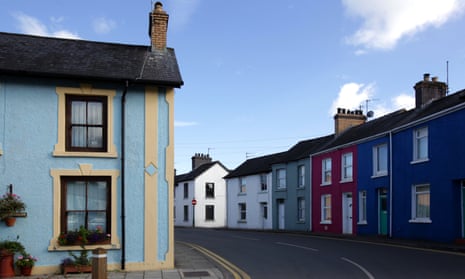House prices rose in October at the fastest annual rate in almost six years but the UK market is likely to face a “sharp” slowdown when the government’s stamp duty holiday ends, the mortgage lender Nationwide has warned.
The average UK house price jumped by 5.8% in October compared with the same month last year, to £227,826, according to the UK’s biggest building society.
The housing market has experienced a mini boom after the UK-wide coronavirus lockdown, partly fuelled by the government’s temporary cuts to stamp duty, which come to an end in March.
Prices rose by 0.8% month on month in October, following September’s 0.9% rise and a 2% jump in August. Nationwide said housing activity “remained robust” even as the economy weakens and unemployment rises, with mortgage approvals climbing to 91,500 in September, the highest level since 2007.
“The housing market has remained robust,” said Robert Gardner, Nationwide’s chief economist. “However, activity is likely to slow in the coming quarters, perhaps sharply, if the labour market weakens as most analysts expect, especially once the stamp duty holiday expires in March.”
Economic growth slowed sharply to 2.1% in August, down from 6.4% in July, despite the boost given to the hospitality sector by the government’s eat out to help out scheme. The unemployment rate is on the rise – hitting 4.5% for the three months to the end of August – with job losses set to mount following the chancellor Rishi Sunak’s move to implement a less generous furlough scheme after Saturday.
“While the UK teeters on the brink of a nationwide lockdown, the housing market continues to defy conventional wisdom, as pent-up demand is exacerbated by buyers rushing to beat the stamp duty holiday deadline,” said Guy Harrington, the chief executive of the residential lender Glenhawk.
“The warning lights are well and truly flashing, however, with grim unemployment data, the stock market in freefall and mortgage providers tightening their lending criteria. The government must hope that predictions for a deep recession don’t materialise, otherwise the inevitable collapse in sales volumes will quickly unwind this recovery.”
The stamp duty holiday for properties below £500,000 is set to expire on the 31 March 2021, unless Sunak chooses to extend it.
The pandemic has irrevocably changed working habits for many people, with remote and flexible working now a permanent fixture, which has in turn shaken up the housing market.
Areas including the south-west of England and commuter towns surrounding London have experienced price increases of more than 5% in the third quarter.
“With further pending lockdowns and working environment changes for the foreseeable future, families are looking to purchase bigger homes, allowing them more flexibility and home comforts,” said Tomer Aboody, a director at property lender MT Finance.
However, getting on the property ladder continues to be an increasingly difficult prospect for many first-time buyers.
Research by Hamptons International for the Guardian found that to afford the average first-time buyer property in Great Britain, borrowers who had put together a 15% deposit would need a household income of £37,096 to get a mortgage.
Assuming households of two people working full time, it said 70% would be able to achieve that figure. However, they would need to raise a deposit of £29,458.
“We know significant numbers of aspiring first-time buyers are looking for more space, a garden, an office or a combination of all three,” said Nigel Purves, the chief executive of Wayhome. “However, amid the rise in unemployment and sluggish wage growth, the associated hike in house prices does nothing for the many ‘reluctant renters’ whose dreams of homeownership seem increasingly out of reach. We need to see new pathways to homeownership to support more people moving onto the housing ladder.”
